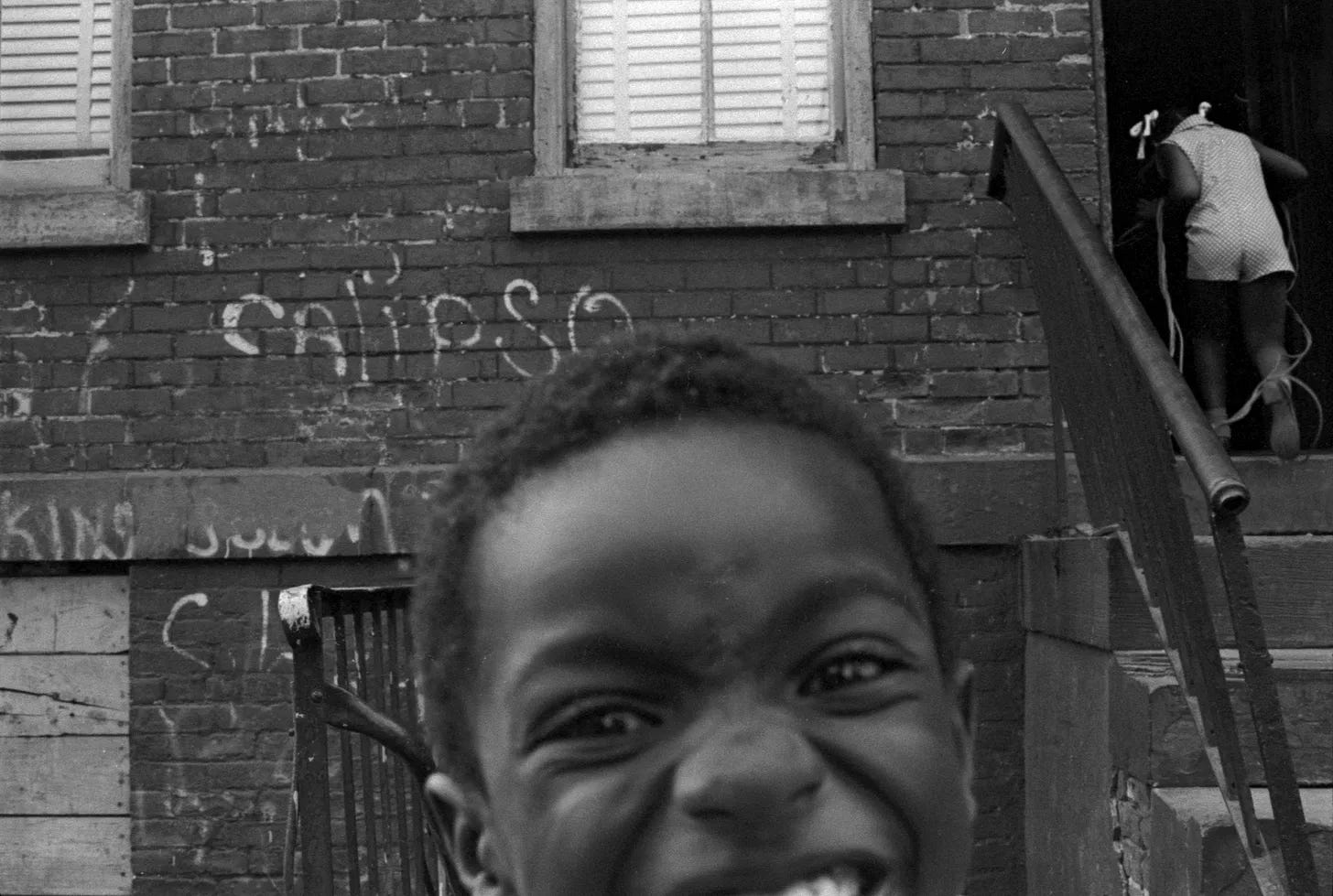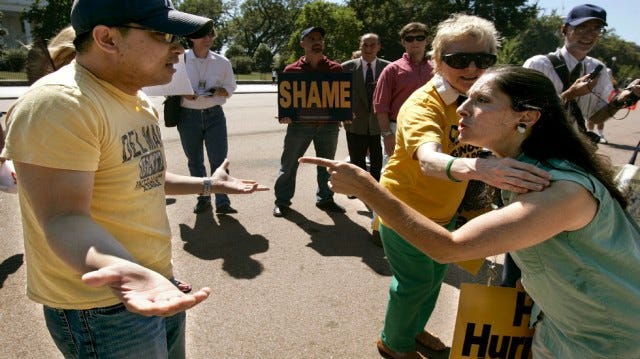How honest American history can cultivate gratitude
This week on our Substack, Jeffrey K. Mann writes about his educational experience in the 1970s and 1980s, and how it “instilled in [him] a sense of gratitude and optimism for America.” However, he notes, “this is regrettably absent from our culture today.”
A narrative that fixates on one group oppressing other groups; that proffers no hope for improvement; that is unable to see progress; that discards heroic efforts by imperfect men and women; renders gratitude impossible. As the research makes clear, this is not conducive to our health and well-being. Neither is it helpful to be gripped by the fear that your government is hopelessly corrupt, bent on taking away your rights, and ushering in a socialist regime. Cynicism and scorn for our fellow citizens and obsessing on their failures leads to shallow historical analyses and an unhealthy self-perception.
A different narrative, which appears more honest, accurate, critical, and helpful, is the same one that Martin Luther King Jr. embraced. With regard to race, he taught, “The American people are infected with racism—that is the peril. Paradoxically, they are also infected with democratic ideals—that is the hope. While doing wrong, they have the potential to do right.”
The Politically Charged Murder Shaking Paris
For The Atlantic, FAIR Advisor Thomas Chatterton Williams writes about a “shocking and brutal crime” of a twelve-year-old girl named Lola, which has “dominated the news in France and reverberated throughout right-wing traditional and social media well beyond Europe.” Williams also discusses the rise of the term “francocide,” in response, which he calls “not-at-all subtle racial instigation.”
Since Lola’s death a week ago, that ethno-term has gained widespread traction—particularly on social media, where it’s become a popular hashtag—fueled by the underlying assumption that any attack or crime perpetrated by a non-French migrant against a French person is inherently racist and racially predatory. Unstated but clearly intended is the corresponding understanding of Frenchness as synonymous with whiteness and foreignness as equivalent to nonwhiteness. As the writer Raphaël Enthoven replied to Zemmour on Twitter, “The fight against the ‘francocides’ would probably be less lively if the victim were a black French Muslim and the culprit a white Polish Catholic.” Although proving a counterfactual is impossible, it is certainly difficult to picture the nationalists grabbing their umbrellas and massing in the pouring rain to protest the latter situation.
America’s crime wave is not a right-wing myth
For Spiked, FAIR Advisor Batya Ungar-Sargon writes that “high-profile Democrats and progressives have repeatedly dismissed voters’ concerns about crime, casting the fears of regular Americans as a reflection of conservative fear-mongering” and warning that this will cost Democrats in upcoming elections.
You have to wonder, is it really wise to gaslight voters in this way? Is it wise to tell them they are wrong to care about what they are telling you they care about? Because they really do care about crime. According to Gallup, 80 per cent of Americans say that they are worried about crime, including 43 per cent of Democrats who worry about crime ‘a great deal’. A Morning Consult / Politico poll finds similar numbers. Over three-quarters of respondents say violent crime is a major problem in the United States, with 60 per cent saying crime would play a major role in who they vote for in November’s Midterms. And in a NewsNation poll of registered voters, over 85 per cent of respondents say crime is either somewhat or very important to their decision about who they would vote for.
Why I Keep Getting Mistaken for a Conservative
For the National Review, Kat Rosenfield writes about the many times she has been assumed to be a conservative, despite always having been of the “free-speech and bleeding-heart variety” of liberal, and why it keeps happening.
This is a theory I’ve had for some time, but it crystallized in the writing of this piece: In our current era, politics no longer have anything to do with policy. Nor are they about principles, or values, or a vision for the future of the country. They’re about tribalism, and aesthetics, and vibes. They’re about lockstep solidarity with your chosen team, to which you must demonstrate your loyalty through fierce and unwavering conformity. And most of all, they’re about hating the right people.
Politics in 2022 are defined not by whom you vote for, but by whom you wish to harm.
Winston Marshall: ‘Quitting Mumford & Sons let me keep my integrity, my dignity and my soul’
For The Telegraph, Zoe Strimpel writes about FAIR in the Arts Fellow Winston Marshall’s experience being called a “fascist” for supporting a controversial writer’s book, leaving his successful band Mumford & Sons in the aftermath, and how despite the chaos he feels he made the right decision.
The Boys Feminism Left Behind
For Bari Weiss’ Substack Common Sense, Richard V. Reeves writes that “patriarchy has been effectively demolished in advanced economies,” but “this rise of women has been accompanied by male decline,” and “it is past time we recognized and started to address these problems.”
If feminism is a social movement motivated by justice and equality of opportunity, then feminists concerned about racial inequality must also care about men. Among those suffering most from the social trends I have described are those from less advantaged backgrounds, especially black men. Black women are seizing educational opportunities long denied to them. Black women aged 25 to 29 hold more graduate degrees, for example, than white men of the same age. Meanwhile, the gender gap in education between black women and black men is widest of all. Two black women for every black man get a college degree. And black mothers are most likely to return to work fastest after having a child; given that they are more likely than black men to be the main earner, many simply have no choice.
False Representation: Why it’s important for Students for Fair Admissions to win its discrimination case against Harvard
For City Journal, Wai Wah Chin writes that while the upcoming Supreme Court hearings on Students for Fair Admissions (SFFA) v. Harvard “is nominally about racial discrimination against Asian-Americans in Harvard admissions, similar forms of discrimination have long become pervasive beyond college campuses.” Chin argues that “an unambiguous, comprehensive Supreme Court ruling in favor of SFFA is sorely needed.”
How did we get here? The racial-diversity rationale for race-conscious college admissions was introduced in Regents of the University of California v. Bakke(1978) and upheld in Grutter v. Bollinger (2003) as a “compelling governmental interest,” giving pass to otherwise unconstitutional racial discrimination. The only prior Supreme Court case that invoked the iron hand of compelling governmental interest in a collective racial context was the infamous Korematsu v. United States (1944). That case helped enforce the relocation of Japanese-Americans during the extraordinary times of World War II—arguably, a damaging precedent for Grutter. Furthermore, Justice Lewis Powell’s justification for the racial-diversity rationale for admissions in Bakke—that it promoted a “robust exchange of ideas” on campuses—has long been debunked. Universities are increasingly factories for intellectual conformity, policed by a relentless cancel culture.
Let’s Subsidize Intellectual Curiosity Again
For Inside Higher Ed, Nicole Barbaro writes that “no matter which side of the debate you fall on, it’s hard to argue with the fact that canceling up to $20,000 in student debt will not fix the entrenched problems of higher education’s debt and tuition crises.”
Student debt is a symptom of a philosophical shift in higher education’s purpose that began decades ago, in the 1960s. As explained by journalist Will Bunch in his new book, After the Ivory Tower Falls (HarperCollins), the election of Ronald Reagan as California governor in 1966 marked the end of the golden era of higher education in postwar America that was fueled by the GI Bill and rapid expansion of our higher education system. During this time, higher education was radically affordable, and, in Reagan’s state of California, tuition-free public higher education for state residents was a promise.
We have betrayed Salman Rushdie once again
For Spiked, Tom Slater writes that “as the full extent of [Salman] Rushdie’s injuries and his alleged attacker’s motives become clearer, we should take no more nonsense about offensive words being a form violence,” and that ”the news of Rushdie’s condition is a grim reminder of how damp the response to the attack has been.”
The Western world is at risk of betraying Salman Rushdie for a second time, just as Western elites debased themselves after the fatwa was issued. The UK government may have offered Rushdie police protection back in 1989, but Margaret Thatcher and her ministers also made a point of extending their sympathy to the Islamists who were offended. Jimmy Carter went one better, declaring The Satanic Verses an ‘insult’ to Islam barely a month after the fatwa was issued. ‘There is no law in life or nature that says great religions may be insulted with impunity’, was the response of fellow author John le Carré.
Why Americans are concealing their true political beliefs
For The Hill, Erin Norman writes about “a new study from Populace Insights” which “shines light on how deeply American adults are affected by social pressure to fit in, especially when it comes to hot-button political issues” and the ways this affects the larger social and political discourse.
Perhaps this chilling environment helps explain why trust in American institutions has plummeted in recent years. If our society has created an environment where people do not feel free to share their opinions, the default expectation may now be that everyone is hiding something. It might also explain the rise of political candidates of otherwise questionable experience and ability that have been successful with a simple “say it like it is” campaign strategy.
Cowardice at Sundance
For The Atlantic, Graeme Wood writes about Meg Smaker, her film The UnRedacted (formerly Jihad Rehab), and the various criticisms surrounding it—most notably that “at least one of Smaker’s subjects” said “that the existence of this film places him in danger.”
Something is strange about these claims. Like all graduates of Saudi Arabia’s terror-rehab program, the men are forbidden from contact with former or current jihadists, including one another, and are not supposed to talk with foreigners or the media. (Smaker says the Saudi government gave them special permission to talk with her.) The Guardian’s reporter told me the quote was “shared with The Guardian.” I asked Cage and Stafford Smith for proof that any of the men has claimed to be at risk. They did not reply. It would be strange for the Saudi government to ungag one of the subjects of the film, just so he can tell Cage or The Guardian that the Saudi government might harm him if the film comes out.
Want to help advance civil rights and liberties for all, and promote a common culture based on fairness, understanding, and humanity? Sign up for a free subscription today!
Join the FAIR Community
Become a FAIR volunteer or to join a FAIR chapter.
Join a Welcome to FAIR Zoom information session to learn more about our mission, or watch a previously recorded session in the Members section of www.fairforall.org.
Take the Pro-Human Pledge and help promote a common culture based on fairness, understanding, and humanity.
Join the FAIR community to connect and share information with other members.
Share your reviews and incident reports on our FAIR Transparency website.
















So many interesting articles here, and so few that I can read because they're behind a paywall. Is there no solution to this problem?
Shame on Thomas Chatterton Williams for turning aside the legitimate concerns of the French in favor of a vile racial indictment against them (and, implicitly, against Americans objecting to their own borders being overrun by illegal immigrants). FAIR needs to have a little sit-down with Mr. Williams to determine whether his views really conform to the admirable charter, goals, and practice of the organization. They most certainly do not from this reader's chair.